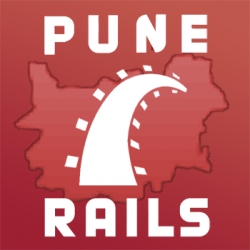(This is a report of Pune Ruby on Rails meetup that happened on 12th December. This report was originally written by Gautam Rege on his blog, and is reproduced here with permission for the benefit of PuneTech readers.)

It was great to be a part of the Pune Rails Meetup which was held yesterday (19th December, 2009) at ThoughtWorks, Pune. It was an idea initiated by Anthony Hsiao of Sapna Solutions which has got the Pune Rails community up on their feet. Helping him organize was a pleasure!
It was great to see almost 35 people for this meet — it was a probably more than what we expected. It was also heartening to see a good mix in the crowd – professionals in rails, students working in rails and students interested in rails – not to forget entrepreneurs who were very helpful.
Proceedings began with Vincent and _______ (fill in the gaps please — am really lousy with names) from ThinkDRY gave an excellent presentation on BlankApplication – a CMS++ that they are developing. I say CMS++ because its not just another CMS but has quite a lot of ready-to-use features that gets developers jump-started. There were interesting discussions regarding how ‘workspaces’ are managed and how its indeed easier to manage websites.
After this technical talk, I spoke next on my experience at the Lone Star Ruby Conference in Texas. I tried to keep the session interactive with the intention of telling everyone how important it is to know and use Ruby effectively while working in Rails. Dave Thomas’s references to the ‘glorious imperfection’ of Ruby did create quite a buzz. To quote a little from Dave’s talk:
name {}
This is a method which takes a block as a parameter but the following line is a method which takes a has as a parameter! A simple curly parenthesis makes all the difference!
name ( {} )
Similarly, the following line is a method m() whose result is divided by ‘n’ whose result is divided by ‘o’
m/n/o
but add a space between this and its a method m() which takes a regular expression as a parameter!
m /n/o
It was nice to see everyone get involved in these interactive sessions. More details about my experience at LSRC is here.
After this there was another technical talk about a multi-app architecture that has been developed by Sapna Solutions. Anthony and Hari gave a talk on this and it was very interesting to see it work. Using opensource applications like shopify, CMS and other social networking apps to work with a shared-plugin and a single database, its possible to create a mammoth application which is easily customizable and scalable.
Hari did mention a few problems like complexity in migrations and custom routes which they currently ‘work-around’ but prefer a cleaner approach. Some good suggestions were provided by Scot from ThoughtWorks regarding databases. I suggested some meta-programing to align models. Working with git submodules and ensuring rake scripts to sync up data, this indeed seems to have a lot of potential.
There were some new entrepreneurs from ______ who have already developed a live application in Merb which they discussed and explained details of. It was good to hear about how they managed performance and scalability testing. The Q&A forum which was the next event was extremely interactive. Some of the discussions were:
Which are really great CMS in Rails?
There were some intense discussions regarding RadiantCMS, Adva and even BlankApp. The general consensus was a ‘programmable CMS’ Vs WYSIWYG. Those who prefer more of the content management prefer CMS’s like Drupal, Joomla. Those who prefer more customization via programing and code, prefer Radiant. This topic could not close and is still open for discussion.. Do comment in your views – I am a radiant fan ![]()
What about testing? Cucumber, Rspec, others?
Usually its still adhoc – testing is expensive for smaller firms — so adhoc blackbox testing is what is done. I opined that cucumber and rspec ROCK! Cucumber is great for scenario testing and testing controller logic and views. Rspec is great for Direct Model Access and Cucumber can make great use of Webrat for browser testing.
In Rpsec, when do we use mocks and stubs?
It was suggested that mocks and stubs should be used when there are no ready model and code. If the code is ready, its probably just enough not to use mocks and stubs directly. Comments welcome on this!
How do you do stress testing?
Stress testing, concurrency testing and performance testing can be done using http-perf. It was interesting to note that ____ have actually done their own implementation for stress and concurrency testing. I recommended they open source it.
How are events, scheduled job and delayed jobs handled?
This was my domain ![]() Using delayed_job is the way to go. Following the leaders (github) and using Redis and resque would be great too but definitely not backgrounDrb or direct cron!
Using delayed_job is the way to go. Following the leaders (github) and using Redis and resque would be great too but definitely not backgrounDrb or direct cron!
What project management tools do you use? Pivotal Tracker, Trac, Mingle?
Pivotal tracker suits startup needs. Mingle rocks but becomes expensive. Scott ? ![]() Dhaval from TW mentioned how easy it was to co-ordinate an ‘mingle’ with their 200 strong team over distributed geographies.
Dhaval from TW mentioned how easy it was to co-ordinate an ‘mingle’ with their 200 strong team over distributed geographies.
Which SCM do you use? git, svn, cvs?
People have been very comfortable with git and more and more are migrating from svn to git. It was heartening to see that nobody uses CVS ![]() Jaju (I have have misspelt) gave an excellent brief about how code and diffs can be squished and ‘diff’ed with another repository before the final merge and push to the master. Dhaval gave an idea about how they effectively used git for managing their 1GB source code (wow!)
Jaju (I have have misspelt) gave an excellent brief about how code and diffs can be squished and ‘diff’ed with another repository before the final merge and push to the master. Dhaval gave an idea about how they effectively used git for managing their 1GB source code (wow!)
Some pending questions – probably in next meet-up
- Which hosting service do you use and why?
- TDD or BDD?
Suggestions are welcome!
About the Author – Gautam Rege
Gautam Rege is the co-founder and managing director at Josh Software, Pune.
Gautam has an engineering degree in Computer Science from PICT, Pune. In his 9 years in the IT industry, he has worked in companies like Symantec, Zensar and Cybage before starting Josh 2 years ago.
Gautam’s technical knowledge spans from various languages like C, C++, Perl, python, Java to software expertize in various industry domains like Finance, Manufacturing, Insurance and even advertising.
As with the company name, Gautam has a lot of ‘josh’ about new and emerging technologies. His company is one of the few which works almost exclusively in Ruby on Rails, the cutting edge web technology that has taken the industry by storm.
(Comments on this article are closed. Please comment at the location of the original article)
![Reblog this post [with Zemanta]](http://img.zemanta.com/reblog_b.png?x-id=7dd80619-799b-4d7c-9070-8c081835dcc7)
![Reblog this post [with Zemanta]](http://img.zemanta.com/reblog_e.png?x-id=952032d0-eefa-4df0-8729-51f1ebb48adc)

![Reblog this post [with Zemanta]](http://img.zemanta.com/reblog_b.png?x-id=176834de-d2a4-4b1e-949f-463f9f4d7854)

![Reblog this post [with Zemanta]](http://img.zemanta.com/reblog_b.png?x-id=a8f3870b-d92a-41b5-9757-e2507d9e105f)
![Reblog this post [with Zemanta]](http://img.zemanta.com/reblog_b.png?x-id=c05dd354-33bb-4058-a31f-57c548632695)



![Reblog this post [with Zemanta]](http://img.zemanta.com/reblog_b.png?x-id=f565f5bf-1e53-467a-ae0b-33ddc6bf2482)

![Reblog this post [with Zemanta]](http://img.zemanta.com/reblog_b.png?x-id=100ae1d9-cb01-4b3a-8a71-a36ce250ca3e)